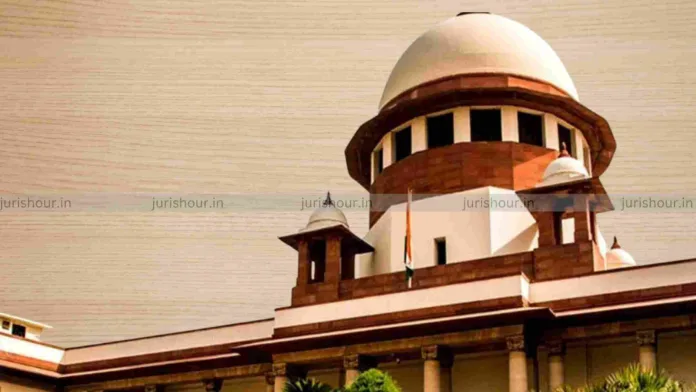The Supreme Court has held that if the judgment is not delivered within 3 months, the Registrar General shall place the matters before the Chief Justice for orders and the Chief Justice shall bring it to the notice of the concerned Bench for pronouncing the order within two weeks thereafter, failing which the matter be assigned to another Bench.
The bench of Justice Sanjay Karol and Justice Prashant Kumar Mishra has relied on its decision in the case of Anil Rai vs. State of Bihar which dealt with such state of affairs prevalent in some High Courts wherein after conclusion of arguments, judgments are not pronounced for a period spread over years. The Apex Court made observations and issued the detailed guideline and noted that no period for pronouncement of judgment is contemplated either under the Civil Procedure Code or the Criminal Procedure Code, but as the pronouncement of the judgment is a part of the justice dispensation system, it has to be without delay. In a country like ours where people consider the Judges only second to God, efforts be made to strengthen that belief of the common man. Delay in disposal of the cases facilitates the people to raise eyebrows, sometimes genuinely which, if not checked, may shake the confidence of the people in the judicial system. A time has come when the judiciary itself has to assert for preserving its stature, respect and regards for the attainment of the rule of law. For the fault of a few, the glorious and glittering name of the judiciary cannot be permitted to be made ugly. It is the policy and purpose of law, to have speedy justice for which efforts are required to be made to come up to the expectation of the society of ensuring speedy, untainted and unpolluted justice.
The Appeals have been preferred against the interim orders passed by the Allahabad High
Court by which the criminal appeal preferred by assused was not taken up for hearing.
By order dated 15.04.2025, the Court requested the High Court to decide the appeal expeditiously preferably within a period of three months. However, considering that the criminal appeal pending before the High Court was earlier reserved for orders on 24.12.2021, but the judgment was not delivered necessitating orders from the Chief Justice of the High Court of Judicature at Allahabad to assign the matter to a different Bench.
The bench noted that it is extremely shocking and surprising that the judgment was not delivered for almost a year from the date when the appeal was heard. This Court is repeatedly confronted with similar matters wherein proceedings are kept pending in the High Court for more than three months, in some cases for more than six months or years wherein judgments are not delivered after hearing the matter. In most of the High Courts, there is no mechanism where the litigant can approach the concerned Bench or the Chief Justice bringing to its notice the delay in delivery of judgment. In such situation, the litigant loses his faith in the judicial process defeating the ends of justice.
The court noted that some High Courts have adopted practice of pronouncing the final order without reasoned judgment, which is not delivered for substantial length of time depriving the aggrieved party of the opportunity to seek further judicial redressal.
The court in addition to the the guidelines/directions issued by the Court in Anil Rai directed the Registrar General of each High Court to furnish to the Chief Justice of the High Court a list of cases where the judgment reserved is not pronounced within the remaining period of that month and keep on repeating the same for three months. If the judgment is not delivered within three months, the Registrar General shall place the matters before the Chief Justice for orders and the Chief Justice shall bring it to the notice of the concerned Bench for pronouncing the order within two weeks thereafter, failing which the matter be assigned to another Bench.
Guidelines In Anil Rai vs. State of Bihar
The Apex Court has issued the following guidelines in Anil Rai vs. State of Bihar .
- The Chief Justices of the High Courts may issue appropriate directions to the Registry that in a case where the judgment is reserved and is pronounced later, a column be added in the judgment where, on the first page, after the cause-title, date of reserving the judgment and date of pronouncing it be separately mentioned by the Court Officer concerned.
- That Chief Justices of the High Courts, on their administrative side, should direct the Court Officers/Readers of the various Benches in the High Courts to furnish every month the list of cases in the matters where the judgments reserved are not pronounced within the period of that month.
- On noticing that after conclusion of the arguments the judgment is not pronounced within a period of two months, the Chief Justice concerned shall draw the attention of the Bench concerned to the pending matter. The Chief Justice may also see the desirability of circulating the statement of such cases in which the judgments have not been pronounced within a period of six weeks from the date of conclusion of the arguments amongst the Judges of the High Court for their information. Such communication be conveyed as confidential and in a sealed cover.
- Where a judgment is not pronounced within three months from the date of reserving it, any of the parties in the case is permitted to file an application in the High Court with a prayer for early judgment. Such application, as and when filed, shall be listed before the Bench concerned within two days excluding the intervening holidays.
Case Details
Case Title: Ravindra Pratap Shahi Versus State Of U.P. & Ors.
Case No.: CRIMINAL APPEAL NO(S).3700-3701 OF 2025
Date: August 25, 2025

